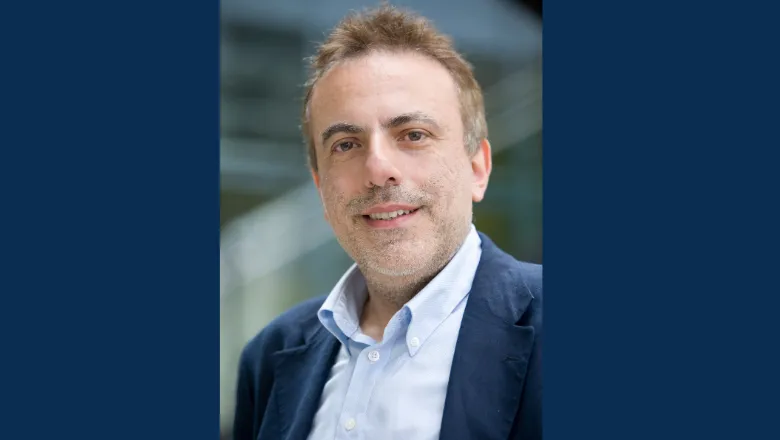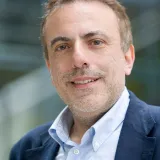01 May 2019
5 mins with…Albert Ferro
Albert Ferro is Professor of Cardiovascular Clinical Pharmacology in the Vascular Biology and Inflammation Section of our School. His research interests include the regulation of vascular endothelial nitric oxide signalling and the role of platelet-leukocyte cross-talk in the pathophysiology of atherosclerosis. He teaches both medical and science students on cardiovascular disease and on pharmacology including clinical pharmacology. He also works as an Honorary Consultant Physician and Hypertension Specialist at Guy’s & St Thomas’ Hospitals. Albert joined King’s in 1996 and was promoted to professor in 2009.

Briefly, tell me about your background and career up to this point
I qualified in medicine from King’s in 1984 and trained initially as a cardiologist, subsequently changing to clinical pharmacology as I found that this allowed me to combine my interests in cardiovascular medicine and in clinical use of medicines. It also afforded me a good way in to becoming a clinical academic and, having done my PhD in Cambridge with Morris Brown, I eventually came full circle and returned to King’s (initially UMDS, but later King’s when KCL merged with it) in 1996, initially as a Senior Lecturer, then Reader, and finally Professor in 2009.
What research are you currently working on?
My particular interest at the moment is the role of inflammation in the pathophysiology of atherosclerosis. This interest emerged from studying the role of platelets in cardiovascular disease, and I became interested in how platelets not only control blood clotting but also are pro-inflammatory, for example because of their binding to leukocytes once they are activated – and specifically, their binding to monocytes, since monocytes are particularly involved in atherosclerosis. I’ve since also become involved in researching other mediators which modulate the inflammatory process in the arterial wall, for example netrin-1. As well as doing basic research into these areas, we are currently conducting a clinical trial on a novel drug which inhibits neutrophil homing (a CXCR2 inhibitor), to determine whether it might be of benefit in patients with coronary heart disease, on top of their usual therapies.
What is a typical day like for you?
My days are generally very varied, both within each day and from one day to another. On a particular day, I might for example do a clinic in the morning, then give a lecture or two in the afternoon, and round the day off with a research meeting. The following day I might be at the Royal College of Physicians, chairing an all-day MRCP(UK) Board meeting. It’s the sheer variety of the nature of my work that both maintains my interest and keeps me on my toes.
Where is your research area heading in the next five years?
We’ve already made huge inroads into treating people with coronary disease and stroke by more intensive lipid lowering and anti-platelet therapy, coupled with other adjunctive treatments, but despite this atherosclerosis and its complications remains the biggest cause of death and disability in the UK. I believe that new therapies which target inflammation in atherosclerosis will be the next big thing in the field in the next few years, and will bring about a further step change in outcome in these patients.
What would you like members of our school to most know about you and your research area?
That I would love to collaborate with anyone out there who would like to explore novel therapeutic targets in atherosclerosis – whether they be basic scientists or clinicians.
What is your favourite part about your current role?
I love that I get to do things that I find really interesting, whether it be exploring research questions that no-one has ever explored before, talking to students and being inspired by them to delve deeper into things that I had always previously taken at face value, and meeting patients – who are the real reason that we are all here after all.
What do you do with your time outside of academia?
Aside from trying to spend as much quality time as possible with my wife and 11 year-old twin boys, I play tennis (badly), am an amateur astronomer (but still have much to learn), and sing in a choir (bass – which I enjoy, but am not so sure if my enjoyment is shared by the listeners!).
What advice would you give to your 18-year-old self?
Not to panic and get too stressed about what you are going to do with your life. Just work in an area you enjoy and that interests you, and it will all (usually) turn out fine. And conversely, don’t spend ages of your time on things that don’t fire your imagination. You spend a huge fraction of your life working, and if the work isn’t fun that is not a good path to happiness.
Who do you look up to (inside or outside of academia)?
My wife – she has an amazing ability to see the wood for the trees. She can see what is important in a situation and what is just trivial.
Any leaving remarks that you would like other members of our school to know about you?
Having been there, done that and bought the T-shirt, I think I now qualify as the Wise Old Elf (a character with whom anyone with young children will be familiar). Well, maybe not the Wise bit…
QUICK-FIRE:
Favourite Movie: Jean de Florette. Although foreign language films are not everybody’s cup of tea, the story is gripping and the Provençal countryside so beautiful, it’s hard not to fall in love with this film.
Favourite Book: Northern Lights by Philip Pullman – as well as all his Dark Materials trilogy, which gives an interesting take on an alternative universe (or more precisely universes) and also on science in general.
Favourite TV Show: Frasier – although it’s getting quite old now (like me), but never ceases to make me laugh (I see disturbing parallels between myself and him!). I never watch medical dramas or documentaries – I like to switch off from the day job at home.
Favourite Scientist: I’d have to nominate two: Carl Sagan and Richard Feynman – two of the absolute best popularisers of science that ever lived.

